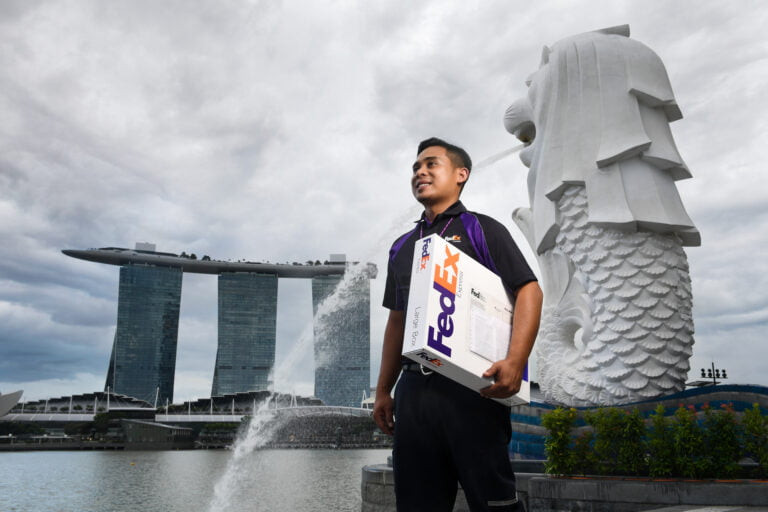The Asia Pacific (APAC) region is a critical crossroads for global trade, one of the most important economic and innovation hubs of the 21st century, and an engine for the airfreight industry. Over 2024 and beyond, the economies in the region are projected to grow faster than the advanced markets of the West.
Southeast Asia, for example, is forecast to grow at 4.3 percent this year. By 2050, Indonesia will be the fifth largest economy in the world, while markets like Vietnam are also forecast to make significant gains.
This presents an opportunity for businesses of all sizes, to support importers and exporters in the region over both the near term and long term.
“Our new regional headquarters is the latest progression of our significant long-term growth and investment in Singapore. It adds to our South Pacific Hub, our regional Life Sciences Center, APAC IT hub and APAC Center of Excellence for Data and Analytics, which are all located in the city,” Kawal Preet, President of Asia Pacific, Middle East, and Africa, FedEx Express, said.
APAC approach
The pandemic taught companies to build greater resilience and elasticity in their supply chains to help them withstand external shocks and recover quickly. Today, companies are looking to create multiple hubs across the region.
Southeast Asian markets are clear beneficiaries of this shift. Take Vietnam for example, with its growing manufacturing in increasingly higher-value goods and services. In response, FedEx Express added a new flight from Ho Chi Minh City to provide faster connectivity to Europe through our APAC hub in China.
“Our customers today are using a blend of multi-economy, multi-dimensional supply networks, and we need multiple logistic hubs to maintain a strong presence in every market we serve to provide service excellence,” Preet stated.
At the same time, China is the world’s second largest economy, and carriers remain committed to supporting customers and the local economy there. China is also the largest trading partner for the Association of Southeast Asian Nations (ASEAN) for 14 consecutive years.
“We recently marked 40 years of our operations in China and inaugurated our new China HQ. We are confident in China’s prospects and will continue to enhance our local presence. By building more flexible, efficient, and intelligent supply chains, we are strengthening trade ties and connectivity between China, Asia Pacific, and the world,” she continued. “The growing Greater Bay Area economy that includes Hong Kong and southern China, where FedEx APAC Hub is located, is comparable in size to Italy’s and is expected to continue to be a driving force for Hong Kong’s financial markets and a wide range of industries .”
Emerging e-commerce
With the rapid development in global e-commerce, businesses large and small are now finding customers internationally to drive revenue growth. Today’s start-ups and small businesses are born digital global e-tailers and they need seamless logistics solutions to be successful. The global retail e-commerce market is estimated to reach a compound annual growth rate of 9.8 percent between 2024 and 2028, with China and Indonesia among the biggest markets in APAC.
For carriers to fully capitalise on the opportunity this represents, they need to think carefully about the needs of the shipper and the shopper. Delivery is a critical component of the customer experience in e-commerce. That means companies need to be fully embedded within the e-commerce ecosystem.
“First, we’re focused on making it easier for e-tailers to access our services and solutions that make order fulfilment more efficient. To give e-tailers direct access to our services, we are integrating with e-commerce marketplaces like eBay and BigCommerce,” Preet highlighted.
“To help e-tailers improve service levels while optimising their operations and lowering their cost-to-serve, we have solutions that enable enhanced fulfilment, last-mile delivery and hassle-free returns.”
Opportunity abounds
FedEx operates at the intersection of the physical and digital world, and is building the smart supply chains of the future. Singapore is a leading innovation centre and ranks third globally in digital competitiveness.
“We share the same values with the city, including digital innovation and harnessing smart technologies to create jobs and business opportunities. There’s a strong pool of talent here to support both our local and regional needs, like our IT hub and data and analytics centre,” Preet explained.
Singapore’s strategic location and advanced infrastructure complements FedEx’s expertise in moving not only parcels but also specialised, heavy, or odd-size airfreight shipments that exceed the normal size restrictions, offering customers the ability to combine pickup, line-haul, and delivery options to meet their transportation needs. The healthcare sector is a perfect example, as these shipments demand very specific technical and regulatory know-how, as well as investments in facilities and talent over a long period of time.




